As a result of her lack of knowledge on how to boost immunity naturally, Maryam was visiting the emergency department for the fourth time in just two weeks with her 4-year-old daughter, who has been suffering from ongoing diarrhea and noticeable weight loss. A thorough clinical assessment revealed the root of the issue: the little girl wasn’t getting daily servings of fruits, vegetables, or protein.
“Her immune system is waving a red flag,” I told Maryam gently. “Without fruits, vegetables, and protein, her body doesn’t have the fuel it needs to fight even the mildest infection.”
We worked with Maryam to build a practical meal plan using SMART goals: simple, measurable, achievable, realistic, and time-bound strategies. Small steps, but powerful ones and potentially life-saving.
Why Boosting Immunity Naturally Matters
Your immune system is your body’s natural defense against infections, viruses, and diseases. In Nigeria, where access to healthcare can be inconsistent and outbreaks like malaria, typhoid, and the flu are common, having a strong immune system isn’t just ideal, it is indeed essential. Fortunately, Nigeria is blessed with a wide variety of natural foods that are rich in immunity-boosting nutrients.
Eating to strengthen your immunity isn’t about exotic supplements or expensive imports. It’s about harnessing the power of everyday Nigerian ingredients to fuel your body’s defense system.
How Your Diet Boosts Immunity Naturally
What you eat directly affects your immune cells, gut health, and inflammatory responses. According to the Harvard T.H. Chan School of Public Health, nutrients like vitamins C, D, zinc, and antioxidants play crucial roles in supporting the immune response.
When you choose nutrient-dense foods over processed ones, you give your body the tools it needs to fight infections and recover faster from illness.
Top Nigerian Superfoods That Boost Immunity
1. Garlic and Ginger
Garlic contains allicin, a compound known to enhance immune function. Ginger, on the other hand, has anti-inflammatory and antioxidant properties. Boil them into tea, blend into sauces, or add to soups.
Dr. Ngozi Okonkwo, a Lagos-based nutritionist, says: “Garlic and ginger are powerful antimicrobials. They reduce the severity and frequency of infections when taken regularly.”

2. Bitter Leaf (Onugbu)
Rich in antioxidants, vitamins A and C, and plant compounds that reduce inflammation, bitter leaf is a staple in immune-boosting soups.
A 2022 study published in the African Journal of Food Science confirmed bitter leaf’s potential to modulate immune responses (source).
3. Ugwu (Fluted Pumpkin Leaves)
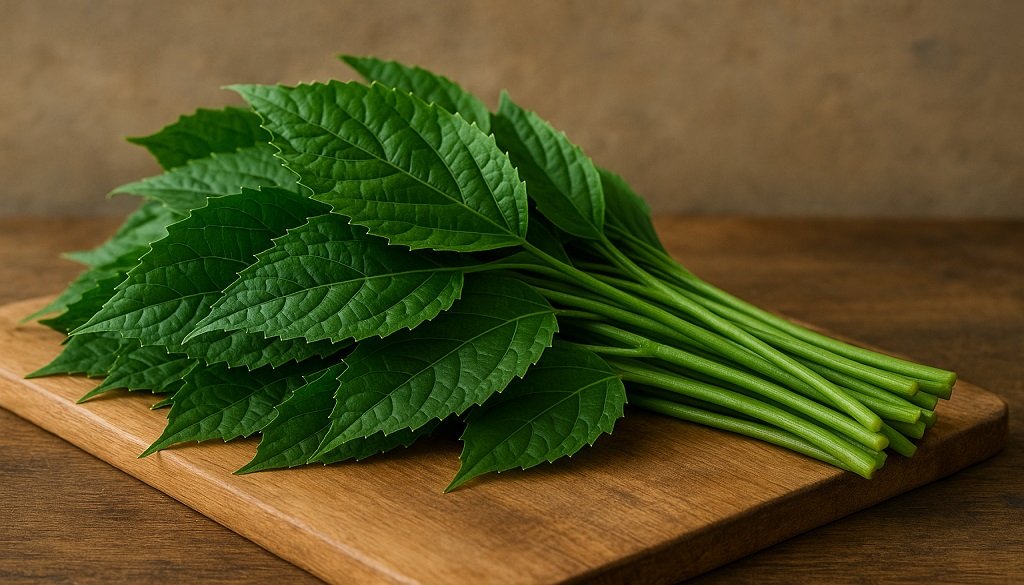
Ugwu is packed with iron, vitamin A, and antioxidants. It improves blood quality and supports tissue repair, essential for a strong immune system.
4. Zobo (Hibiscus Tea)
Zobo is rich in vitamin C and anthocyanins that help fight oxidative stress. It supports cardiovascular and immune health, especially when unsweetened. Read also: Lower Blood Pressure Naturally
5. Fermented Locust Beans (Iru)
Iru promotes gut health by providing probiotics, which help regulate immunity. A healthy gut equals a healthier immune system.
6. Sweet Potatoes
Loaded with beta-carotene (a form of vitamin A), sweet potatoes help protect mucous membranes and the respiratory system.
7. Unripe Plantain

Unripe plantain contains resistant starch and vitamin B6. It improves gut health and regulates immune function.
8. Palm Oil (in moderation)
Red palm oil is rich in vitamin E and beta-carotene. It’s great for immunity, but consume it in moderation due to its saturated fat content.
9. Groundnuts and Tiger Nuts
These nuts contain zinc, magnesium, and healthy fats that support immune cells and hormonal balance.
Immunity-Boosting Spices in Nigerian Cooking
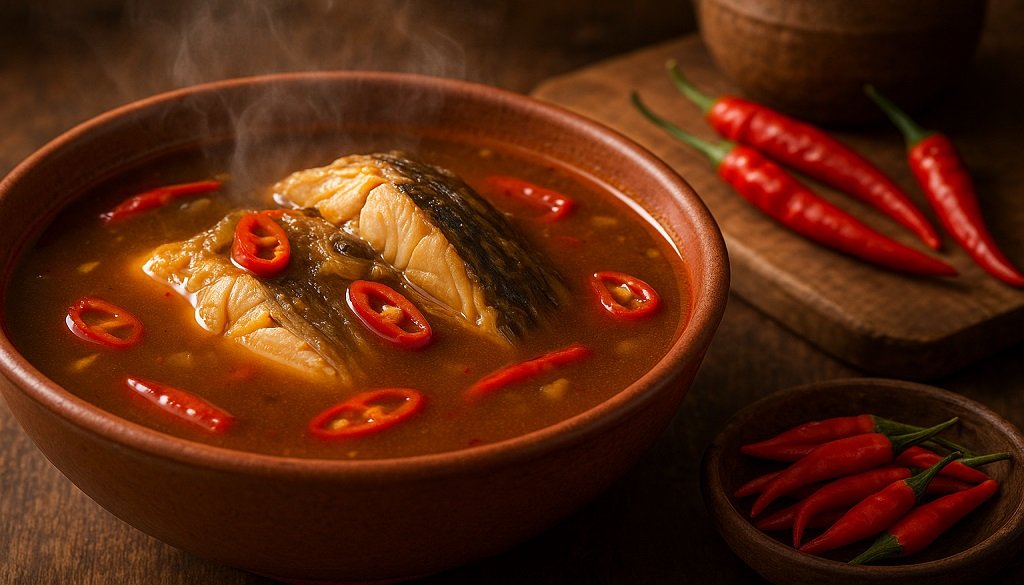
Our traditional spices are more than flavor agents:
- Turmeric (found in curry): Contains curcumin, an anti-inflammatory powerhouse.
- Cayenne Pepper: High in capsaicin, it improves circulation and metabolism.
- Thyme & Clove: Possess antimicrobial properties that support respiratory health.
Local Soups and Stews That Boost Immunity Naturally
- Ofe Onugbu (Bitter leaf soup): Detoxifies and strengthens immunity.
- Ofe Nsala (White soup): Made with fresh catfish and spices like uda (negro pepper) and uziza.
- Afang Soup: Combines water leaves and okazi leaves, which is very rich in vitamins C and K.
Chef Bukola Shonibare says: “Nigerian soups are therapeutic. When prepared with fresh vegetables, herbs, and clean protein, they nourish and heal the body.”
Hydration and Herbal Teas That Support Immunity
Drinking enough fluids is key to flushing out toxins. Herbal teas like:
- Lemon-grass tea: Has antibacterial properties.
- Scent leaf tea (Efirin): Used to fight flu and respiratory issues.
- Neem tea (Dogoyaro): Traditionally used to manage malaria and infections. Read also: Home Remedies for Malaria
Avoid sugary drinks; they can suppress immune activity.
The Role of Probiotics and Fermented Foods in Natural Immunity
Your gut houses about 70% of your immune cells. Nigerian fermented foods like:
- Ogi (fermented pap)
- Fufu (from fermented cassava)
- Iru (locust beans)
…help restore gut flora and prevent inflammation.
According to the World Journal of Clinical Nutrition (2020), fermented foods improve mucosal immunity and protect against pathogens (source).
Foods to Limit for a Stronger Immune System

Avoid:
- Refined sugar (in excess). Read also: How Hidden Sugars Sabotage Your Health
- Highly processed snacks (e.g., sausage rolls, chin-chin)
- Carbonated soft drinks
- Overcooked or canned foods that have lost nutrients
These foods promote inflammation and weaken your immune response.
Naija Daily Meal Plan to Boost Immunity Naturally
Morning:
- Ogi with moi moi or boiled eggs
- Zobo or warm ginger tea
Afternoon:
- Brown rice with Afang soup + goat meat
- Fresh fruit (orange or pawpaw)
Evening:
- Boiled unripe plantain with vegetable sauce
- Herbal tea (scent leaf)
Snacks: Roasted groundnuts, tiger nuts, or boiled corn.
Expert Opinions on Nutrition and Immunity
“Nutrition is the first line of defense. When we nourish our bodies with local foods rich in vitamins, we activate our immune defenses naturally.” — Dr. Amina Yusuf, Public Health Consultant
“Many people ignore our indigenous foods. They are affordable and powerful for immune health.” — Prof. Adewale Adeyemo, Department of Human Nutrition, UI.
Local and Global Research Findings
- Nigerian Institute of Medical Research emphasizes the immunological benefits of vegetables like bitter leaf and ugu.
WHO recommends diets rich in whole plant foods to reduce disease burden globally (source).
Food Classes That Support Immunity
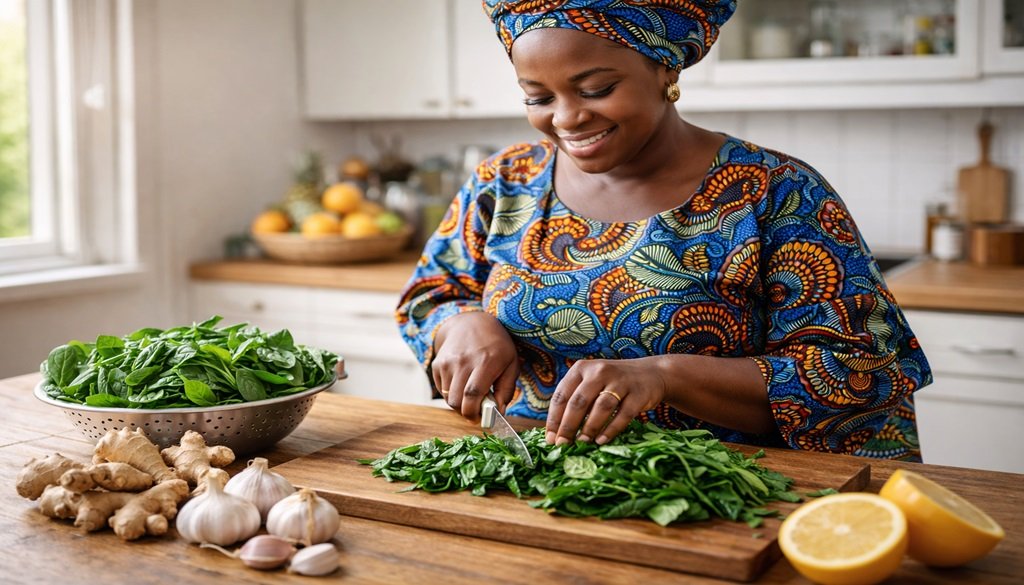
Fruits & Vegetables: Nature’s Multivitamins
If your immune system had a wish list, fruits and veggies would be at the top. Packed with essential vitamins, minerals, fiber, water, and antioxidants, these natural gems are your first line of defense.
Star Picks:
- Citrus fruits – like oranges, lemons, and grapefruits, are rich in Vitamin C, which helps produce infection-fighting white blood cells.
- Dark leafy greens – spinach, kale, and especially moringa (zogale), are loaded with Vitamin A, C, and iron.
- Baobab fruit – this African superfruit is a powerhouse of Vitamin C and antioxidants.
- Root vegetables – carrots, pumpkin, and sweet potatoes provide beta-carotene, which helps maintain healthy skin and mucous membranes (your first defense barrier!).
A 2021 study in the Journal of Clinical Medicine linked diets rich in colorful fruits and vegetables to reduced risk of respiratory infections.
Tip: Add chopped moringa leaves to soups, stews, or stir-fries. It adds flavor, tradition, and major nutrients!
Protein Power: Building Blocks for Immunity
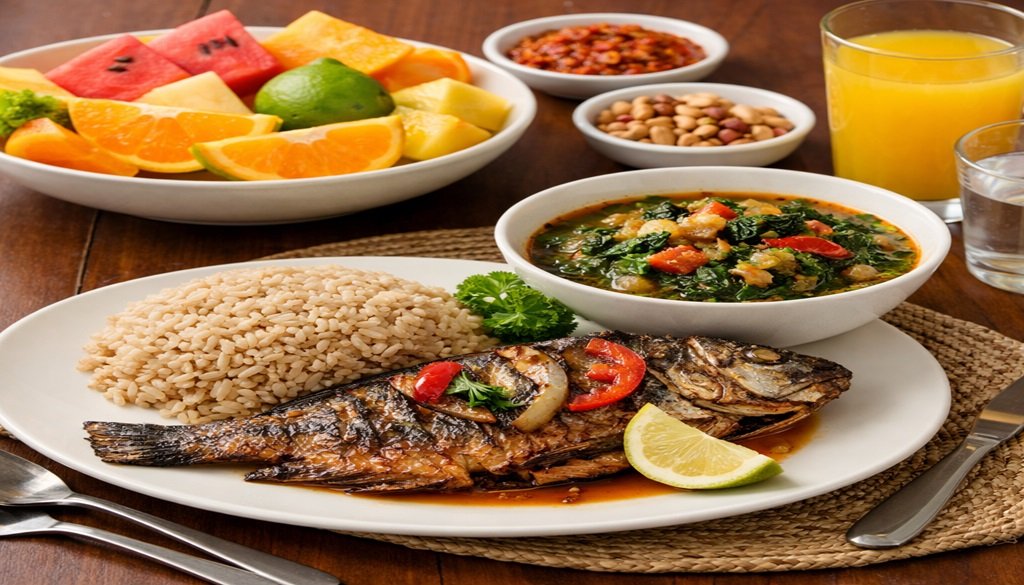
Protein does more than build muscles—it builds immune cells, enzymes, and antibodies. Without it, your immune response weakens like a house missing bricks. Read also: Best Diet For Weight Loss
Best Sources:
- Lean meats and poultry – like turkey, chicken, and beef provide iron and zinc, crucial for immune cell production.
- Beans, lentils, and chickpeas – affordable, plant-based proteins commonly found in African and Western diets.
- Egusi (melon seeds) – packed with protein and healthy fats, this West African gem doubles as food and medicine.
- Fatty fish – like mackerel and sardines are rich in Omega-3 fatty acids and Vitamin D, supporting immune balance.
A 2020 review in Frontiers in Nutrition emphasized that low protein intake impairs immune function, especially in children and the elderly.
Expert Quote:
“If you want your immune system to fight, give it the tools it needs—protein is the hammer and nails.” – Dr. A. Adedeji, Lagos Nutrition Research Institute
Whole Grains & Legumes: Fueling Gut and Immune Health
Did you know your gut is home to nearly 70% of your immune system? That’s right! And feeding it the right foods makes all the difference.
Gut-Friendly Staples:
- Whole grains – such as ofada (brown rice), millet, fonio, and oats are rich in fiber and B vitamins.
- Legumes – soybeans, groundnuts, pigeon peas support gut bacteria and deliver plant protein.
- Barley and quinoa – great additions for a hearty immune-supportive meal.
According to the British Journal of Nutrition (2022), diets high in fiber from whole grains promote healthy gut bacteria, improving the body’s ability to fight infection.
Try this: Swap white rice for ofada rice or pair a veggie-rich stew with fonio instead of semolina.
Herbs & Spices: Ancient Remedies, Modern Science
From the comforting warmth of pepper soup to turmeric lattes in trendy cafés, herbs and spices are more than flavor—they’re medicine in disguise.
Immunity MVPs:
- Garlic & ginger – nature’s antimicrobials, they fight off bacteria and reduce inflammation.
- Turmeric (curcumin) – supports immune responses and calms inflammation.
- Scent leaf (nchuanwu or efirin) – packed with essential oils that improve respiratory health.
- Cayenne & black pepper – increase nutrient absorption and support detox.
A 2021 study in Phytotherapy Research revealed that regular garlic intake can cut down cold frequency by 60%!
Pro Tip: Start your day with a mug of hot water, ginger, lemon, and turmeric. It’s soothing and immunity-boosting.
Healthy Fats: The Good Guys
Not all fats are created equal. Healthy fats help absorb key vitamins (A, D, E, K) and build strong immune cell membranes.
Good Fat Sources:
- Avocados and nuts – rich in Vitamin E, a powerful antioxidant.
- Palm oil – used in moderation, offers tocotrienols, a form of vitamin E.
- Coconut oil – contains lauric acid, known for antimicrobial properties.
- Olive oil – full of anti-inflammatory benefits and heart health perks.
The American Journal of Clinical Nutrition (2023) links unsaturated fats to better immune cell function and inflammation control.
Fermented Foods: The Forgotten Immune Secret
These foods aren’t just tangy and tasty, indeed they’re full of probiotics that nourish your gut and immunity.
Fermented Favorites:
- Yogurt and kefir – loaded with live cultures.
- Ogi (pap) and kunun zaki – traditional African drinks that deliver probiotic goodness.
- Kimchi and sauerkraut – global fermented options that complement immune health.
In many African households, lightly fermented porridges are given to babies early on, this offers a hidden immunity advantage from day one.
Water & Hydrating Foods: The Silent Hero

Water may be simple, but it’s essential. Every immune function relies on proper hydration to transport nutrients, flush toxins, and support your body’s defenses. Read also: Lifeline of Hydration
Don’t Forget:
- Cucumber, watermelon, oranges – full of water, fiber, and immune-supportive vitamins.
- Zobo (hibiscus drink) – antioxidant-rich and refreshing.
Bridging African and Global Wisdom: Build a Balanced Plate
No matter where you are—Nairobi, Accra, Cape Town, London, or NYC—the recipe for immunity remains: diversity, balance, and whole foods.
Combine local treasures like ogbono, moringa, and millet with global staples like olive oil, oats, and yogurt. That’s your wellness plate—rooted in tradition, supported by science.
FAQs on Boosting Immunity With Nigerian Foods
- Can food alone prevent illness?
No, but food plays a vital role in reducing your risk and speeding up recovery. - Are traditional Nigerian diets healthy?
Yes—if unprocessed and plant-rich. - How often should I eat garlic and ginger?
2-3 times per week, preferably fresh. - Is palm oil good or bad?
Moderate consumption is beneficial; avoid overheating. - What fruits help immunity?
Oranges, guavas, mangoes, pawpaw, and watermelon. - Should I avoid red meat?
No, but eat lean cuts in moderation. - Can children eat these immunity foods?
Absolutely. Just adjust the portions. - Does Zobo really work for immunity?
Yes, especially when prepared without sugar. - Can I take supplements instead?
Food should be your first choice. Use supplements if prescribed. - What’s the best immunity soup?
Afang or bitter leaf soups with fish or lean meats.
Final Thoughts: Eat Smart, Stay Strong
Building a strong immune system doesn’t require a foreign diet or expensive treatments. Nigeria is richly blessed with everything you need; vegetables, herbs, spices, nuts, and natural drinks. Make small changes to your meals, and over time, you’ll see the difference in your energy levels, resistance to illness, and overall wellbeing.
“Let food be thy medicine.” — Hippocrates
And today’s research confirms it.
What immunity boosting foods are you starting with this week? Share your journey in the comments.
This post is only for education and is not a substitute for medical consultation.

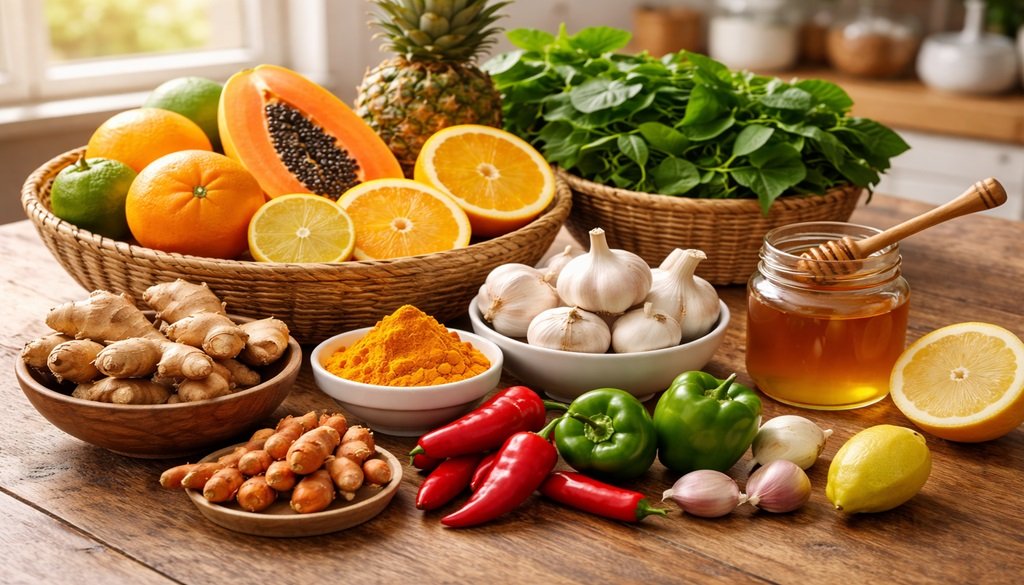


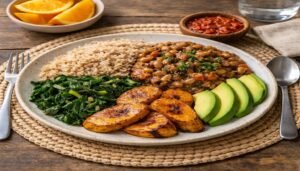
Pingback: Natural Remedies for Arthritis: Healing Wisdom from Africa and Around the World - Healths Clinic
Pingback: Get Tested for STD— If You See These 10 Warning Signs - Healths Clinic
Pingback: The Best Diet For Weight Loss And Muscle Gain - Healths Clinic
Pingback: The Best Pregnancy Care Tips for Nigerian Women
Pingback: How to Get Quality Healthcare in Nigeria on a Budget
Pingback: Effective Natural Ulcer Cure Remedies in Nigeria
Pingback: Natural Remedies for Arthritis: From Africa and Beyond
Pingback: Get Tested for STD—Top 10 Warning Signs to Know
Pingback: Setting SMART Health Goals Improves Well-Being
Pingback: Diabetes Mellitus: Causes, Signs, and Management Strategies
Pingback: Power-Packed Nigerian Superfoods for Better Health
Pingback: Ending Polio in Nigeria: Gaps, Risks and Hope
Pingback: Plant-Based Vegan Meal Plan for Healthy Living